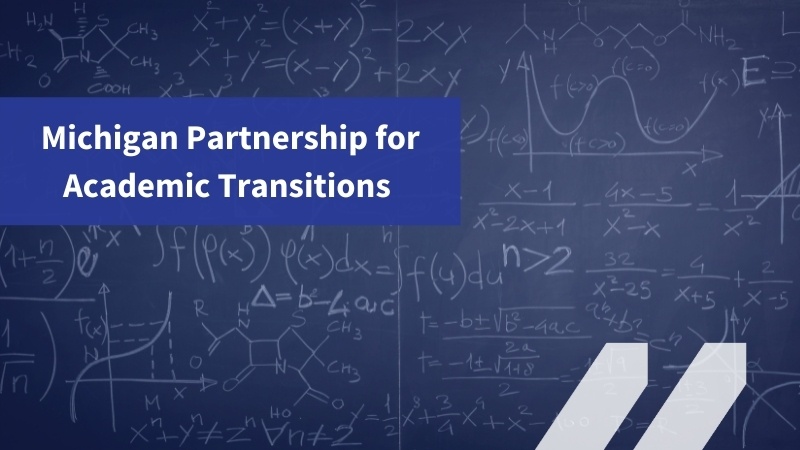
LANSING, Mich. — Michigan College Access Network (MCAN) has announced three new college/high school learning teams joining the Michigan Partnership for Academic Transitions (MI-PAT) initiative. This program leverages the combined creative energies of high schools and colleges to remove barriers and support student success. This will be achieved through redesign of developmental education and improved academic transitions, with a focus on closing racial equity gaps through increasing the number of first-year community college students who complete a gateway (credit-bearing, transferable) math course.
MI-PAT connects community colleges with high schools in their region to form learning teams that commit to working toward specific improvements consistent with the core aims of the initiative. To support their efforts, the teams receive grant funding, broad design parameters, and access to technical assistance and national experts who work on high-impact practices associated with improved academic transitions and gateway course completion.
Research from the Charles A. Dana Center indicates that only 18 percent of Michigan community college students placed into remedial math courses complete their degree within three years. Rather than prepare students for the demands of postsecondary education, many gateway courses unintentionally filter students out of higher education.
Redesigning developmental education also directly works to close racial equity gaps in postsecondary education. The State of Michigan’s College Remedial Coursework report reveals that of the 2018-2019 high school graduates that enrolled in community college, 15.1 percent of white students were enrolled in remedial coursework. In the same year, 31 percent of African American students and 26.4 percent of Hispanic/Latino students were enrolled in remedial coursework. This trend is not new, and the goal of the MI-PAT initiative is to remove such barriers for students of color.
“When gateway courses lack intentional design and fail to center students’ needs, they act as barriers to student success,” said Ryan Fewins-Bliss, MCAN executive director. “Research shows that 17.5 percent of Michigan high school graduates enrolled in community college are in a remedial course. On top of that, Black and Hispanic students are overwhelmingly more likely to be assigned to remedial classes than other students. When we collaborate with community colleges to reform transitional math courses, we see improvements in educational equity and student success, and increase completion rates in support of Michigan’s Sixty by 30 goal.”
MI-PAT Cohort 2 learning teams:
- Henry Ford College (Dearborn, Mich.) — partnering with Dearborn Public Schools, Crestwood High School and Allen Park High School
- Gogebic Community College (Ironwood, Mich.) — partnering with Luther L. Wright High School and Ewen-Trout Creek High School
- Grand Rapids Community College (Grand Rapids, Mich.) — partnering with Grand Rapids Public Schools
The first MI-PAT cohort launched in early 2021. It includes Kalamazoo Valley Community College, Macomb Community College and Monroe County Community College.
MI-PAT is a multi-year collaboration between Michigan College Access Network, the Michigan Center for Student Success and the Michigan Community College Association. Funding is provided by the Kresge Foundation.
Second cohort includes Henry Ford College, Gogebic Community College and Grand Rapids Community College